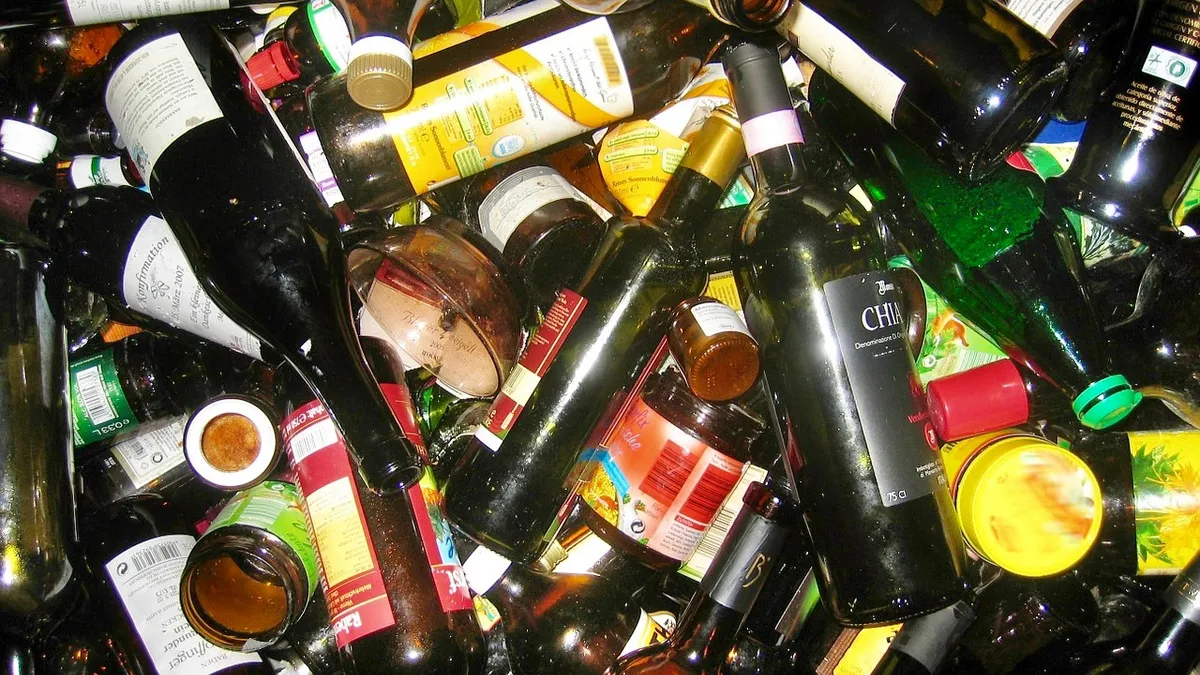Dive Brief:
- A new study by the Rochester Institute of Technology's Pollution Prevention Institute shows that expanding New York's bottle bill to offer a 5-cent deposit on wine and liquor bottles would increase those items' recycling rates by 65% and eliminate low-value material from more than 160 MRFs. But it could also cost the state's more than 4,500 wine and liquor sellers a collective $36 million for labor and/or reverse vending machine equipment.
- The report, commissioned by the state's Department of Environmental Conservation, stops short of giving any recommendations about whether New York should expand the bottle redemption program. The authors recommend further research on several elements, including costs and redemption alternatives, before determining the best path forward.
- New York last added new containers — water bottles — to its redemption program in 2009. Although the new study didn't offer recommendations either for or against further expansion, industry participants indicate the conclusions drawn about increased glass recycling rates could prompt legislative action.
Dive Insight:
Even though the report did not offer recommendations, industry participants say the implications for New York's bottle bill are clear.
"The main message is that the current avenues of recycling for wine and liquor bottles are either not working or performing at a very low level, and there's an opportunity to have wine and liquor bottle recycling rates at a very high level. That's through adding wine and liquor bottles to the deposit program," Susan Collins, executive director of the Container Recycling Institute (CRI), told Waste Dive.
The report examined and benchmarked programs in the 10 states that currently have bottle bills: California, Connecticut, Hawaii, Iowa, Maine, Massachusetts, Michigan, New York, Oregon and Vermont. Three states include liquor bottles in their redemption programs and two include wine bottles.
In general, glass container recycling rates in states with a deposit program are 40% higher than in states without one. Containers reclaimed through a deposit program contain less contamination than those collected curbside. That presents a more attractive glass recycling prospect at a time when the material is being dropped from a number of communities' curbside programs nationwide.
"For far too long, glass has been an issue at our Material Recovery Facilities, causing contamination to other quality materials and abrasiveness to processing equipment. The removal of glass from the curbside recycling bin would be welcome to MRFs that are struggling to make a profit in today’s challenging recycling commodities marketplace," Luann Meyer, president of the Solid Waste Association of North America's New York chapter, told Waste Dive via email. "The SWANA-NY Chapter is appreciative that the state has taken the initiative to study the possibility of adding wine, liquor, cider and other non-alcoholic glass beverage containers to the NYS bottle bill."
Collins points out that glass is considered a "China-proof" commodity, similar to PET and aluminum. Whereas other materials took a hit following international material bans and stricter contamination standards, that isn't an issue for glass because it nearly universally remains domestic.
"While we're looking for opportunities and scrambling over what's happened to the paper markets, as long as we can collect glass, aluminum and PET in a way that's clean and free of contamination, the U.S. markets can absorb that material and recycle it," she said.
2019 has been a landmark year for action on bottle bills. Calls for reform to California's bottle bill grew loud after the state's largest redemption center operator, rePlanet, suddenly closed hundreds of recycling centers over the summer. Oregon reported success from its newly expanded bottle bill, which recently doubled deposits from 5 to 10 cents. The move prompted a 64% bump in beverage container recycling, with 90% of beverage containers being recycled.
And the number of governments considering new bottle bills surged this year, both globally and domestically. Up until 2017 there were about 40 programs globally serving 300 million people. According to CRI, those numbers have doubled just between 2017 and today. In the United States alone, nine states introduced bottle bill legislation this year, although it didn't pass. Collins says it's unusual to see more than three or four states try to introduce redemption program legislation in one year.
"What I'm seeing is unbelievable," said Collins. "We've seen incredible growth of container deposit laws around the world."















